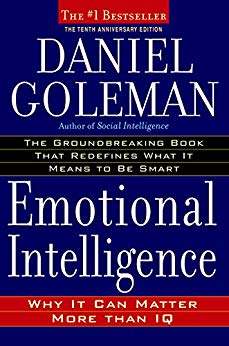

This article is an excerpt from the Shortform summary of "Emotional Intelligence" by Daniel Goleman. Shortform has the world's best summaries of books you should be reading.
Like this article? Sign up for a free trial here .
How does emotional health affect your physical health? How do you get emotional well being aligned with treating your disease?
Emotions are deeply connected to sickness and health, how vulnerable a patient is to disease, or how fast a patient recovers–and yet medicine and medical care often lack any trace of emotional intelligence.
- This is partially because of the high volume of patients any given facility or practitioner sees: caregivers are often overloaded with patients and must rush through their visits to see everyone, or they feel indifferent towards any one patient because they see so many in a day.
- Institutional imperatives–timing the amount of care given, pricing out how much every step of the treatment costs–put a greater emphasis on time and money saved than emotional care given.
Emotional health interventions should be routine practice in medical care.
There’s a subtle difference between disease and illness: disease is the thing a doctor can cure, but illness is the thing a patient suffers. Emotional wellness might not seem to have a correlation to how well a disease is cured–but it has a great impact on how little or how much or just how a patient suffers through their illness.
This is not to say that emotional well-being can, on its own, cure a disease–there are a lot of current trends that suggest people can cure themselves by thinking positively, which is dangerous, not only because it disregards the necessity of medicine in curing illnesses but also because it can make people feel like they’re to blame if they get sick, that it must be in their minds or because they’re not strong enough to “will” themselves to be well.
The Brain of Our Body
Our immune system is the brain of our body, deciding what belongs in our body and what doesn’t, and rejecting the latter. When it recognizes cells, it leaves them alone; when it doesn’t recognize them, it attacks. When it works correctly, our body fights off bacteria, viruses, even cancer–but if it judges incorrectly, it can end up attacking necessary cells and leading to autoimmune diseases like lupus or allergies.
The nervous system is innately connected to our immune system, and, like the brain, our immune system can learn.
- In one study, rats were given medicine that lowered the count of their T cells, cells which are responsible for fighting diseases. Every time they were given the medicine, they took it along with sugar water. Eventually, giving rats the sugar water alone lowered their T cell count, and rats were getting sick and dying from just the water: the experiment had trained their immune systems to suppress T cells in relation to the sugar water.
The chemical messengers with the most extensive operation in the brain and the immune system are most densely found in the neural areas responsible for regulating emotion. So the nervous system not only communicates with the immune system, it is necessary for the immune system to function properly.
Stress can negatively affect immune resistance, though it is temporary–presumably directing energy away from the immune system to deal with the stressor. Of course, if the stress itself is continuous and intense, the resulting suppression of the immune system also continues.
Studies have shown that toxic emotions (stress, negativity, etc.) diminish the effectiveness of some immune cells, though it is not conclusive whether the effect is great enough to make a difference. But it is an accepted practice among surgeons to cancel a surgery if a patient is too scared–scared patients in surgery bleed more, get more infections or sustain more complications, and have a more difficult road to recovery.
- Anxiety and panic cause spikes in blood pressure, and when veins are pressurized, they bleed more when cut.
- Negative emotions, especially prolonged negative states, have a negative effect on the body: chronic anxiety, depression, or paranoia doubles someone’s risk of disease.
- The statistical link between negative emotions and disease is broad, and this should not be interpreted to mean that everyone who experiences chronic negative emotional states is more susceptible to disease.
Negative Emotional States and Your Health
There are three main negative emotions that impact health: anger, anxiety, and depression. We’ll now go into a little more detail on each detractor from emotional health.
Anger and Health
Anger has a major impact on heart health: when we’re angry, the pumping efficiency of our heart drops, sometimes by a small amount, but in some cases by 7% or greater, a state which cardiologists classify as a sign of myocardial ischemia, when blood flow to the heart drops at a dangerous rate.
- To determine this information, one study asked patients who had already suffered a heart attack to recount moments where they had been angry. Most patients reported that they were only half as mad recounting the incident as they had been during–meaning that if they experienced a 7% drop in pumping efficiency recounting the story, at the time of the incident, the percentage would have been higher.
- Anger is the only negative emotion that affects the heart this way: anxiety, depression, nor even physical activity affects the heart the same.
Higher levels are anger are also connected to dying younger. One study performed on physicians themselves found that physicians with the highest scores on a hostility test were 7 times more likely to die by the age of 50 than physicians with lower scores.
Of course, anger by itself does not cause heart problems–but it is one extremely important factor that affects heart performance. And high levels of anger can be lethal to people who already have heart disease.
None of this is to say that suppressing your anger will lead to a healthier heart; on the contrary, suppressing anger can intensify the physical agitation and raise blood pressure even more. The determining quality that makes anger harmful to your health is whether it’s chronic or not. Everyone gets angry from time to time–it’s when you find yourself constantly angry, jumping to anger immediately as a first emotional resort, or in prolonged periods of intense anger, that anger becomes chronic.
But anger and hostility, like all other emotional reactions, can be learned about and controlled. For helpful ways to deal with anger, refer back to previous sections, particularly Managing Emotions.
Anxiety and Health
The most deadly emotion for men is anger, which puts them at greater risk of heart disease. The most deadly emotion for women is anxiety, which puts them at greater risk of developing infections and disease.
Chronic anxiety can:
- Diminish immune function and sometimes increase the metastasis of cancer.
- Increase susceptibility to viral infections.
- Cause more plaque to form in the veins, leading to blood clots and arterial disease.
- Accelerate Type 1 and Type 2 diabetes.
- Trigger or worsen asthma attacks.
- Lead to ulcers, ulcerative colitis, and inflammatory bowel disease.
- Damage the hippocampus (the memory center).
The more stressed we are, the worse our immune system functions. This is why we get sick during stressful periods of time, or right after. Again, it is not clear if the range of impact is of clinical significance.
Depression and Health
Unlike anger and anxiety which can lead to the onset of diseases, depression plays a part in worsening many other existing medical conditions.
Depression often gets overlooked when it accompanies more serious physical illnesses because the symptoms of depression overlap with those illnesses. For instance, loss of appetite, fatigue, or emotional outbursts in a cancer patient might not give a doctor pause–but they could be signs of accompanying depression, which, untreated, might make the patient’s recovery longer, harder, and less successful.
Depression can negatively affect a patient’s recovery because it reduces their will to take care of themselves, their energy to do so, and numbs them to the possible consequences of doing so.
Though it might cost more money up front to treat depression alongside other medical conditions, arguably it would save more money in the long run to do so.
Addiction and Health
Society often looks at drug addicts or alcoholics as people who just can’t control their impulses, and this is true in the sense that impulses are generally emotional needs. One theory suggests that addicts have a chemical imbalance in their brain–but instead of being treated with medication, they’ve found an addictive drug to treat themselves with.
———End of Preview———

Like what you just read? Read the rest of the world's best summary of Daniel Coleman's "Emotional Intelligence: Why It Can Matter More than IQ" at Shortform . Learn the book's critical concepts in 20 minutes or less .
Here's what you'll find in our full Emotional Intelligence summary :
- What are emotions? Why do we have them?
- What is emotional intelligence? Why is it important?
- How do you manage your own emotions? Anger, anxiety, and sadness?
- How can you approach your relationships with more emotional intelligence?
- How can you teach your children emotional intelligence?
- How can emotional intelligence boost your career?






